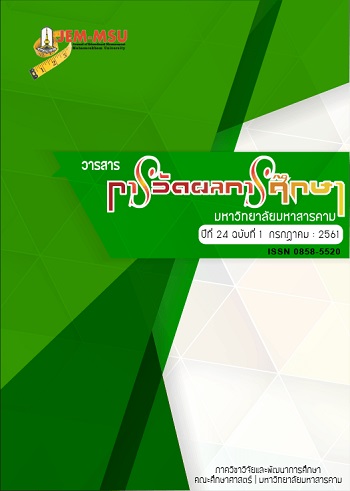Using the Mindfulness Development Program Based on Mastery Learning Principle to Enhance Emotional Intelligence of Teaching Professional Experience Training Students, Mahasarakham University
Main Article Content
Abstract
Teaching professional experience training is the important step in the development
of students in all education curriculums. Students need to adjust themselves to the new
experiences and various problems faced during their teaching practice. Emotional intelligence
is crucial for helping students solve problems properly and appropriately. The research
aimed to 1) design a mindfulness development program based on the mastery learning
principle to enhance emotional intelligence, 2) compare emotional intelligence of teaching
professional experience training students before and after the program treatment, 3) analyze
the feasible factors that influence the learning achievement according to program objectives.
Six student teachers who were undertaking the teaching practicum at special education
schools in KhonKaen province during the second semester of academic year 2015 were
purposively sampled. The research instruments consisted of: 1) the mindfulness
development program designed by the researcher; 2) the Emotional intelligent Test
containing 50 multiple-choice questions adapted from the Emotional Quotient: EQ
developed with item discrimination ranging from 4.05 to 20.77. For construct validity,
correlation coefficients were between 0.30-0.83. Besides, the reliability of the overall test
was at 0.88. The test was given to the target group before and after using the mindfulness
development program; 3) the behavior assessment by close relatives consisting of 13 items;
and 4) daily records of the intense mindfulness activity. The data were analyzed by using
statistical analysis including frequency, percentage, mean. In addition, content analysis is
conducted for interpreting the behaviors resembling the emotional intelligence after the
program learning.
The results revealed that;
1) The designing and the development of mindfulness development program based
on mastery learning principle to enhance emotional intelligence. The Rhythm meditation
and walk meditation is using in mindfulness training. The learner needs to practice every
time they learns in a unit. Learners will learn the knowledge about emotional intelligence
through lectures, group activities, game, role-playing, watching video. And group debates.
Program consisted of: 1) Principles and rationale 2) The purpose of the program. 3) Program
Structure 4) The content of learning activities consists of 6 units: Unit 1 is mindfulness of selfawareness. Unit 2 is mindfulness of self-management. Unit 3 is mindfulness of selfmotivation. Unit 4 is mindfulness of knowing the emotions other Unit 5 is conscious of social
skills and relationships with others. Unit 6 mindfulness practice at Sukato temple. 5. Assessment
of learning outcomes
2. The comparison of the emotional intelligence of student teachers before and after
being trained in the mindfulness program showed that their average emotional intelligence
scores after the training was at the high level, higher than their pre-test scores and higher
than the determined criterion of 80 %. In addition, the behavior assessment done later by
close relatives of six students revealed that all students had greater emotional intelligence in
all five areas than prior to the training. For unit 6 of intense mindfulness practice at the
temple, the information from interviewing the monk revealed that all students have learned
to be conscious and had emotional intelligence at a high level.
3. Some feasible factors that influenced the learning achievement of the learners
according to the program objectives included: 1) personality of the learners 2) the variety of
learning activities, 3)the appropriateness of learning contents and materials, 4) the close
supervision aimed for giving feedbacks, and 5) the remedial teaching that was appropriate to
the characteristics of each learner.
Some infeasible factors that influenced the learning achievement of the learners
according to the program objectives included: 1) Period in classroom 2) The background
experience in the practice Mindfulness 3) Insufficient rest / Fatigue 4) Illness.
Article Details
The content and information contained in the published article in the Journal of Educational Measurement Mahasarakham University represent the opinions and responsibilities of the authors directly. The editorial board of the journal is not necessarily in agreement with or responsible for any of the content.
The articles, data, content, images, etc. that have been published in the Journal of Educational Measurement Mahasarakham University are copyrighted by the journal. If any individual or organization wishes to reproduce or perform any actions involving the entirety or any part of the content, they must obtain written permission from the Journal of Educational Measurement Mahasarakham University.
References
ชุมชน. 40(1): 54-56.
2. จงจิต ตรีรัตนธำรง. (2543). การศึกษาผลสัมฤทธิ์ทางการเรียนวิชาคณิตศาสตร์เรื่อง ฟังก์ชันเอกซ์โพเนนเชียล
และฟังก์ชันลอการิทึม ของนักเรียนชั้นมัธยมศึกษาปีที่ 5 ด้วยหลักการเรียนเพื่อรอบรู้. วิทยานิพนธ์
ปริญญาศึกษาศาสตรมหาบัณฑิต มหาวิทยาลัยเกษตรศาสตร์
3. นพพร เจริญสุข. (2525). การเปรียบเทียบปัญหาการฝึกสอนของนักศึกษาคณะศึกษาศาสตร์มหาวิทยาลัย
รามคำแหงและมหาวิทยาลัยเชียงใหม่. วิทยานิพนธ์ศึกษาศาสตรมหาบัณฑิต(หลักสูตรและการสอน).
บัณฑิตวิทยาลัย มหาวิทยาลัยรามคำแหง.
4. พงษ์ธารา วิจิตเวชไพศาล. (2551). การเรียนแบบรอบรู้. วารสารศึกษาศาสตร์มหาวิทยาลัยสุโขทัยธรรมาธิราช.
19 : 1.
5. พระธรรมปิฎก (ประยุทธ์ ประยุตโต). (2543). เจตโกศลหรือปรีชาเชิงอารมณ์. กระแสวัฒนธรรม. 1,1:4-7.
6. พริ้มเพรา ดิษยวณิช. (2544). ผลของการปฏิบัติวิปัสสนากรรมฐานที่มีต่อบุคลิกภาพและเชาว์อารมณ์.
วารสารสมาคมจิตแพทย์แห่งประเทศไทย, 46 : 3.
7. วรินทร์ทิพย์ หมี้แสน. (2543). ผลของการฝึกสมาธิตามแนวสติปัฎฐาน 4 ที่มีต่อเชาวน์อารมณ์ของนักเรียน
มัธยมศึกษาปีที่ 5 โรงเรียนศึกษาสงเคราะห์ตาก. ครุศาสตร์บัณฑิต บัณฑิตวิทยาลัย
มหาวิทยาลัยขอนแก่น.
8.วีระวัฒน์ ปันนิตามัย. (2544). เชาว์อารมณ์ (EQ). กรุงเทพฯ : เอ็กซ์เปอร์เน็ต.
9. สมจิต จันทร์ฉาย. ( 2557). การออกแบบและพัฒนาการเรียนการสอน. นครปฐม : เพชรเกษมพริ้นติ้ง
กรุ๊ป จำกัด
10. สมชาย สุริยะไกร. (2550). การพัฒนารูปแบบการเรียนบนเว็บแบบปรับเหมาะความแตกต่างระหว่าง
บุคคลด้วยหลักการจัดการเรียนแบบรู้แจ้งเพื่อเสริมสร้างผลสัมฤทธิ์ทางการเรียนและทักษะ
การแก้ปัญหาของนิสิตนักศึกษาเภสัชศาสตร์. วิทยานิพนธ์ปริญญาศึกษาศาสตรดุษฎีบัณฑิต
บัณฑิตวิทยาลัย. มหาวิทยาลัยขอนแก่น.
11. สมหวัง พิธิยานุวัฒน์. (2543). ข้อเสนอเชิงนโยบายการผลิตและพัฒนาครู. กรุงเทพฯ : ส านักงาน
คณะกรรมการการ ศึกษาแห่งชาติ. ส านักนายกรัฐมนตรี.
12. เสริมศรี ไชยศร. (2539). พื้นฐานการสอน. เชียงใหม่ : ลานนาการพิมพ์.
13. อัจฉรา สุขารมณ์ ,อรพินทร์ ชูชม. (2548). โปรแกรมส่งเสริมและพัฒนาความฉลาดทางอารมณ์ตาม
แนวตะวันออกส าหรับเยาวชนไทยเพื่อพัฒนาคุนภาพชีวิตที่ดี. สถาบันวิจัยพฤติกรรมศาสตร์
มหาวิทยาลัยศรีนครินทรวิโรฒ.
14. อมร เพชรสุวรรณ และคณะ. (2549). ปัญหาการฝึกประสบการณ์วิชาชีพครูของนักศึกษาคณะศึกษาศาสตร์
มหาวิทยาลัยราชภัฏจันทรเกษม ปีการศึกษา 2549. รายงานการวิจัย คณะศึกษาศาสตร์
มหาวิทยาลัย ราชภัฏจันทรเกษม.
15. อรรณนพ แสงแจ่ม. (2542). การพัฒนาหลักสูตรฝึกอบรมอาจารย์พี่เลี้ยงนักศึกษาฝึกประสบการณ์วิชาชีพ
ครูวารสารครุศาสตร์. มหาวิทยาลัยราชภัฏมหาสารคาม.
16. อมรรัตน์ วงศ์ประเทศ. (2550). การพัฒนาแบบทดสอบวัดความฉลาดทางอารมณ์ของครูประถมศึกษา
สังกัดสำนักงานเขตพื้นที่การศึกษาสงขลา. วิทยานิพนธ์ กศ.ม. มหาวิทยาลัยทักษิณ.
17. Block,J.H. and Anderson,L.W. (1975). Mastery learning in Classroom instruction. New York
: Macmillan Publishing.
18. Bloom, B.S. (1971). Mastery learning. In J.H. Block (ed.), Mastery learning: Theory and
practice. New York: Holt, Rinehart and Winston.
19. Bloom,B.S. (1982). Human characteristics and school learning. New York : McGrawHill
20. Crystal B. Cowan. (2015). A Case Study of Mastery Learning Activities in Kindergarte Literacy
Centers. [Online]. Doctor of Education (Ed.D.) Walden University Online Available
from : http://scholarworks.waldenu.edu/dissertations/1617/ [accessed 29 July 2016].
21. Goleman, D. (1995). Emotional Intelligence : Why it Can Matters More Than IQ. New York:
Basic Books.
22. Keller, Fred (1968). Good Bye Teacher. Journal of Applied Behavior Analysis. [Online].
Available from : http://it.pedf. cuni.cz/strstud/edutech/2007_PSI_Prikner/soubory/
good_bye_teacher.pdf [accessed 18 July 2014].


